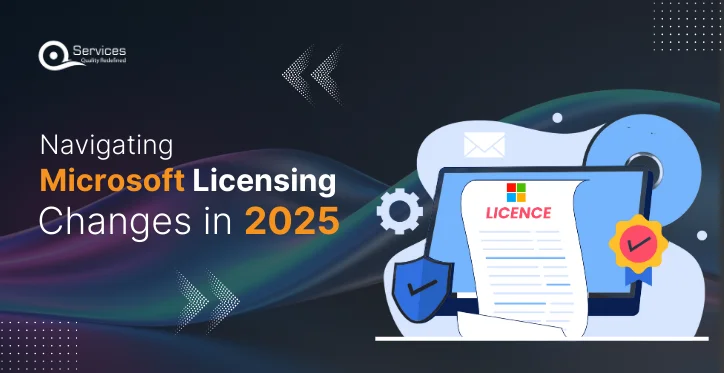
Rewards
.





CANADA
55 Village Center Place, Suite 307 Bldg 4287,
Mississauga ON L4Z 1V9, Canada
Certified Members:
.



Home » Navigating Microsoft Licensing Changes in 2025

In 2025, Microsoft intends to make significant changes to its license guidelines, which might impact businesses of all sizes. To avoid unanticipated costs and disruptions, these changes—which could include anything from product license agreements to adjustments in rising prices—must be well anticipated.
Whether you’re adapting to Microsoft Enterprise Agreement changes or optimizing your Microsoft 365 licensing strategy, understanding these updates is crucial.
Microsoft licensing is how businesses acquire and manage Microsoft products like Microsoft 365, Azure, and Power BI. It’s essential for staying compliant and making the most of your Microsoft tools. A Microsoft licensing guide can help businesses to navigate different options, from simple user licenses to more complex enterprise agreements.
Microsoft offers licensing models to meet diverse business needs
A Microsoft licensing guide is helpful to understand which model is best for your business.
Microsoft is shaking up its licensing for a few reasons:
Microsoft is making big changes to its licensing in 2025, and it’s important to stay ahead. Here’s a quick rundown on what businesses should expect and how to manage the shift.
Microsoft’s Enterprise Agreements (EAs) are being replaced by the Microsoft Customer Agreement for Enterprise (MCA-E). The new structure offers:
Impact: The MCA-E helps reduce complexity and offers more cloud-focused solutions, but businesses will need to adjust their budgets for potential changes in pricing.
The CSP program provides an alternative to traditional licensing with:
Managing licensing costs in 2025 will require adaptability. Here’s how to make that possible:
Review Your Licenses
Don’t let unused licenses pile up. Auditing your licenses regularly can help you identify areas where you can save money by removing unwanted licenses.
Move to the Cloud
Cloud-based services offer flexible pricing that’s often more affordable. The switch could reduce costs, while allowing you to scale resources up or down as needed.
Consult Licensing Experts
Microsoft’s new models might be confusing. Talk to a licensing expert who can help you to find the best option for your needs.
Leverage CSP’s Flexibility
The Cloud Solution Provider (CSP) program is designed to adjust based on your actual usage. That means you won’t overpay for services you don’t need, and you can scale when necessary.
Take action by auditing your licenses, embracing cloud services, and getting expert help to optimize your Microsoft licensing costs.
Microsoft Teams is available now as a standalone product, separate from the Office and Microsoft 365 suites. This means businesses can now choose Teams on its own without needing to buy the full suite, offering more flexibility.
Get free Consultation and let us know your project idea to turn into an amazing digital product.
Microsoft is introducing changes to server and Azure licensing to prioritize flexibility, cost savings, and cloud-first strategies.
Microsoft introduced key updates to its licensing structure for small businesses, making Microsoft 365 Copilot more accessible and flexible. These changes open new opportunities to integrate AI-powered solutions into your business without spending much.
Let’s explore how you can take advantage of these updates.
Microsoft is offering a monthly billing option for Microsoft 365 Copilot, which comes with a 5% premium. This offers small businesses greater flexibility in managing expenses, especially for those with seasonal needs or fluctuating demands. For example, if your business experiences a peak season, you can scale your Copilot usage without the financial commitment of an annual contract.
Expanded Eligibility for Lower-Tier Plans
The big news for small businesses is that Microsoft 365 Copilot is now available to businesses on lower-tier plans such as Business Basic, F1, F3, and Office 365 E1. Previously, Copilot was only accessible to those on higher-tier plans, but now businesses with smaller budgets can take advantage of AI-driven productivity tools.
Start by identifying departments that could benefit the most from Copilot. For instance, customer service teams can leverage Copilot to automate responses and handle more inquiries with greater speed, while HR departments can benefit from automated document generation, such as job postings and interview summaries.
Rather than launching Copilot across the whole company, start by testing it with one team or department. This way, you can see how it impacts productivity, spot any issues, and fine-tune the setup before expanding it.
After successfully piloting Copilot, use the insights to expand its use. Scale slowly to focus on the areas that benefit the most to ensure a stronger ROI over time.
The 2025 MS licensing updates represent a significant opportunity for small businesses to adopt advanced technology. With the new monthly billing option and expanded plan eligibility, even businesses on a budget can benefit from Copilot’s AI-powered features.
Microsoft’s 2025 licensing updates bring important changes to Power BI and the Power Platform that small businesses need to understand. Here’s a quick look at the key updates and strategies to optimize your licensing.
The shift to Azure Fabric-based licensing for Power BI offers greater flexibility and simplifies data management. Ensuring that you’re getting the best value, refer to the Microsoft 365 licensing guide, which explains how these changes affect your pricing and usage.
Microsoft is adding AI-driven features to Power BI, improving data management and reporting. These upgrades offer small businesses smarter insights and more efficient data handling. Revisit your licensing strategy to make sure you’re taking full advantage of these new features.
The new pay-as-you-go model provides flexibility than the traditional one. Depending on your usage, this model could save costs. Use the Microsoft server licensing guide to compare the options and find the most cost-effective solution for your business.
Implementing Regular License Optimization Reviews
Optimizing your licenses regularly ensures you’re not wasting money on unnecessary subscriptions. Continuously reviewing your licenses helps identify where you can cut costs.
As Microsoft continues to evolve itself, staying ahead of licensing changes is key to ensuring your business stays efficient and cost-effective. Here’s how to prepare:
Microsoft is expected with some updates near future including:
To adapt to these changes, here’s how you can build a flexible licensing plan:
By staying proactive and flexible, you can ensure your business is ready for whatever changes Microsoft brings next.

As Microsoft updates its licensing model, businesses have a real opportunity to improve cost management and streamline efficiency. Moving to the MCA-E model and making use of the Cloud Solution Provider program’s flexibility provides many key benefits.
Staying informed and conducting regular license reviews, along with seeking professional guidance, will help you optimize your Microsoft licensing and stay prepared for future changes.

In this blog, we’ll explore how these advances are shaping the future of field services and how companies are adapting to stay ahead in a competitive market. What are the key changes that businesses need to embrace to stay relevant and efficient?

Field service is nowdays getting a much-needed upgrade, thanks to the integration of IoT and Dynamics 365. No longer are businesses stuck in the old “break-and-fix” cycle. With IoT, equipment now tells you when it’s about to have a problem, and Dynamics 365 takes care of the rest—automating workflows,

In this blog, we’ll examine the importance of AI within Dynamics 365 Field Service and its benefits. With Dynamics 365 Field Service, AI helps businesses streamline scheduling and make real-time decisions—ensuring the right technician is always in the right place at the right time.
Microsoft will transition from Enterprise Agreements (EAs) to Microsoft Customer Agreements for Enterprise (MCA-E), introduce price increases for several Microsoft 365 plans, and separate Microsoft Teams from the Office and Microsoft 365 suites.
Price increases for Microsoft 365 plans will take effect in April 2025. It’s essential to review your subscriptions and budget ahead of time.
The MCA-E is a new licensing model replacing traditional Enterprise Agreements, offering more flexibility, simpler processes, and cloud-focused solutions. It is set to replace EAs by January 2025.
Microsoft Teams will now be available as a standalone product, giving businesses more flexibility in billing and allowing them to choose Teams without needing to purchase the full Office or Microsoft 365 suite.
Details about the new Power BI Premium pricing models will be announced closer to their implementation, but businesses should be prepared for potential adjustments.
Audit your current licensing, optimize your subscriptions, and explore CSP options to help minimize the financial impact of Microsoft’s licensing changes.
Leverage Microsoft’s official announcements, consult with your licensing partner, and stay updated by following relevant blogs and industry resources for guidance.
Microsoft 365 Copilot is an AI-powered tool that enhances productivity by automating tasks and improving collaboration. It will be available with flexible billing options starting December 2024.
Start by conducting a thorough licensing audit, reviewing your current Enterprise Agreement (EA) terms, and evaluating new options like MCA-E or CSP to ensure better value.
Take advantage of AI-powered features like Microsoft 365 Copilot, which can help automate tasks and improve collaboration, boosting productivity within your organization.
The NCE provides improved flexibility, simplified licensing processes, and better support through Cloud Solution Provider (CSP) partners, making it easier to manage subscriptions.
Large enterprises will need to reassess their licensing strategies to ensure they are using the most cost-effective options, whether it’s transitioning to MCA-E or exploring CSP for more flexibility.
Evaluate the benefits of CSP, review your current licensing needs, and consult with a CSP partner to ensure a smooth transition to a more adaptable licensing model.
Review your current usage, eliminate unused licenses, and explore the new pricing models for Power BI Premium to ensure you’re getting the best value for your needs.
Early adoption may provide access to advanced AI tools, improved productivity, and potential cost savings by streamlining workflows and enhancing collaboration.
Schedule a Customized Consultation. Shape Your Azure Roadmap with Expert Guidance and Strategies Tailored to Your Business Needs.
.





55 Village Center Place, Suite 307 Bldg 4287,
Mississauga ON L4Z 1V9, Canada
.




Founder and CEO

Chief Sales Officer

🎉 Thank you for your feedback! We appreciate it. 🙌